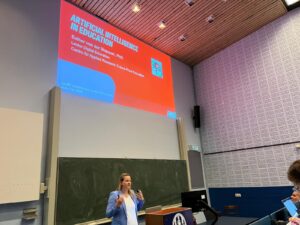Leiden University hosted two one-day conferences on second language learning within just three weeks: the Language Learning Resource Centre’s (LLRC) yearly conference, this time on AI in language education, was held on June 13th. On July 1st there was a one-day conference on rhythm and fluency in second language speaking, as satellite workshop alongside the 2024 Speech Prosody conference. As co-organizer of these one-day events, I got to experience both maximally. It made me realize once again the breadth and wealth of language learning research.
LLRC conference on AI in language education
For the 7th edition of the LLRC conference, presenters from Universities, Universities of Applied Sciences, a secondary school, and a global testing company from The Netherlands and Flanders showed their research and good practices to a crowd of researchers and language teachers from a similar wide range of different institutes, schools, and companies. With 110 participants, it was the busiest edition so far. Apparently, the theme of the day struck a note. Although AI has been around since the 50’s, it is only in the last two years that LLMs and intelligent tools are quickly and drastically changing language use, language learning, and language teaching. When the LLRC committee came up with the timely theme in the fall of 2023, we did not yet know it, but it turned out that June ‘24 was proclaimed as month of AI in education in the Netherlands, with many events throughout the country, and the one by LLRC was linked to it.
AI is not artificial and it is not intelligent
The keynote speaker, Esther van der Stappen (Avans University of Applied Sciences), introduced the theme by bringing together multiple perspectives and bridging the gap between computer science and education, shedding light on practical and ethical aspects of AI in education more in general. She certainly had our attention when she explained what AI is not: it is not artificial and it is not intelligent, to begin with.
Bastogne cookies and second language learning in both conferences
A little over a fortnight later, the one-day conference on prosodic features of learners’ fluency featured two keynote speakers: Lieke van Maastricht (Radboud University) and Malte Belz (Humboldt University, Berlin). Lieke showed how the use of hand-gestures during speaking in a second language should not be ignored, and Malte showed methodological issues that need to be addressed in research on measures of fluency in speaking such as pausing and filled pauses. This conference had some similarities to the LLRC conference, but the differences were more pronounced. To start with the similarities: on both days, technological advancements and tools played a big role; on both days, Bastogne cookies were served during coffee breaks and vegetarian bitterballen at the end of the day. Obviously, the biggest resemblance between both conferences concerned the broad topic of second language learning. But where the day on AI in the language classroom showcased research and practice on language teaching didactics (using AI) in the broadest sense, the conference on prosody and fluency showed research and research methods on very specific aspects that language learners need to master, namely on hesitations and rhythm in speaking.
Making worlds meet
To advance research and practice of language teaching, both types of exchanges among researchers and teachers are helpful, and in the end, we should strive to have both types of worlds meet. For instance, it is one thing to find out that gestures like arm movements should accompany the word or sentence stress, and that second language learners have trouble in timing gestures in this way; it is another thing to teach the timing of gestures to a classroom of 30 students. And indeed, in the closing session on July 1st, three “D”’s were recognized as Big Questions or New Challenges to tackle within the subfield of prosody in linguistics: 1) Differences between individuals in speaking and learning to speak, 2) the Dynamic nature of speaking processes, and, as third “D”: Didactics. So plans to have both types of worlds meet (more often) are already in the making!




Recent Comments